- Home
- Michael P. Spradlin
Blood Riders Page 11
Blood Riders Read online
Page 11
“You ever hear of a senator named Declan? James Declan?” Slater asked, his preternatural calm beginning to unnerve Jonas somewhat.
“No,” he lied.
“Well, I reckon you ain’t from around here, then. What matters is he’s a-heard o’ you and he’d like to talk to you. Right quick-like,” Slater said.
“What about?” Hollister asked.
“Don’t reckon I know. Just do what I’m told. Just like you, if you are Major Jonas Hollister, United States Army. That is you, ain’t it?” Slater asked, his dark eyes darting momentarily as if his knowledge of Jonas’s identity had given him some temporary advantage.
“No dice,” Hollister said. “I don’t take orders from you or any so-called senators. Especially not from ones who send gun hands to request my presence, sneaking up on me like a bunch of Kiowa. You’re damn lucky you didn’t lose your head. You tell the senator, if he wants to talk, Major Jonas Hollister will meet him at the Oriental Hotel tomorrow morning at nine A.M. sharp. You got that?”
“Listen, Mr. . . . Major Hollister, the senator, he’s an impatient man, he wants to talk to you tonight, and if I don’t . . .” Slater stopped talking when Hollister pushed the Colt forward till it rested directly on the tip of Slater’s nose.
“Tomorrow. Nine A.M. Oriental Hotel,” Hollister said. “Is that clear?”
Slater’s eyes changed then. Hollister had done a tour at a Fort in Florida right after the war and living there, he’d seen plenty of gators. Right then, Slater’s eyes reminded him of an alligator, dark and dangerous and peering out of the water, ready to snap.
Slowly and with great deliberation, Slater took a step back and then another. He kept his arms up. His voice was even more tense when he said, “Nine A.M. it is then.” He backed away a few more paces, then turned and walked up the street, his men following along. Hollister held the Colt ready until they turned the corner and disappeared.
Declan. How did he know Jonas was in Denver? Pinkerton had said no one knew except him, the president, and a few members of the Order. Obviously, that was no longer true. He slipped the Colt back into the holster, but not before peering around the side of the building again and looking for any sign of blond hair and a black leather duster. The street was empty.
He headed back the way he had come, eager to report this news to Chee and Pinkerton, wondering one thing with each step: What in the hell was going on?
“Huh,” he muttered to himself.
Shaniah watched the altercation of the men in the Denver street from a rooftop. She had returned to Denver having lost Malachi’s trail again. She couldn’t understand how, but he was growing more and more devious and better able to hide his scent from her. What had he learned in his odyssey from their homeland? Was it the altitude? Unlikely, since they had lived in a high altitude in their homeland. Perhaps the air here was different in some way. Had he uncovered a solution to the natural Archaic fear of water and learned a new way to cross rivers and streams? Or had she lived so long in her high mountain stronghold she had just lost the skills of a hunter?
Then, out of nowhere, she had encountered the man from the Wyoming ridge four years earlier. It was a chance encounter since she had rented a room at a hotel near the tracks. It was not a high-class establishment; it was a place that would not draw attention, run by a Chinese family who asked few questions, but instinctively and respectfully feared her.
She caught his scent as he walked by and there was no doubt it was him: the tall, dark-haired soldier who had survived his encounter with Malachi so many years before. Though she seemed unable to keep Malachi in her sights, her Archaic senses had heightened enough in the months she had been in America, and in a matter of seconds, his walk, his smell, and even the sound of his voice, which she had heard carried on the wind, told her it was him.
Why was this man here? Back then she had traveled near Camp Sturgis and the mining camps at Deadwood a few weeks after Hollister had met his fate, and she’d heard people talking. A captain in the army had lost his platoon—to the Sioux—it was said, and had lied to cover it up. He was going to prison. Shaniah knew this is not what occurred, but understood that the soldier would have had a hard time convincing his human masters what had actually happened. Now the very same man was here in Denver.
Instinct told Shaniah it was not a coincidence. The man may have been released from prison, but with Malachi and his band having slaughtered the miners in the nearby camp, it was unlikely that he was here for another reason. America, she had learned, was too big a place, with too many other places to go. People were talking about what had happened at Torson City; word was leaking out that a survivor of the attack was telling wild tales of monsters and demons on the loose. A local powerful politician—the humans called him a senator—was trying to quell the panic, saying it was only a band of renegade Indians who had attacked the miners. If the soldier had heard these rumors, maybe he had come here seeking revenge. If that was true, the man was foolish.
Shaniah did not believe he was foolish though. She had learned never to make snap judgments. Especially when it came to humans. That day on the Wyoming ridge, the soldier had stood up to Malachi. He had been cautious and even fearful at first, but when Malachi attacked, he’d fought bravely and tried desperately to save his men.
It was odd to see him out at this time of night, so heavily armed and alone. Human men were creatures of the flesh, and at first she thought he might be on his way to find a companion for the night, but when he passed by the brothels without a glance, she became even more intrigued.
After following him a few blocks, she knew he had become aware of the fact that he was being followed. Yet Shaniah was willing to bet that he had no idea he was being stalked by her and four other men. Her curiosity nearly revealed her presence when the soldier stopped and turned suddenly, and were it not for her superior reflexes he might have caught more than a glimpse of her. And a few minutes later, as he encountered the four ruffians in the alley, he likely thought it had been one of those men who had been following him.
She watched the man deal with the men and his behavior intrigued her further. He did not show fear, only the calmness that comes from a healthy dose of self-assurance. By then she was on a rooftop above the confrontation below, two buildings south of them, and could easily hear the entire conversation. It confirmed her suspicions: he was here because of Malachi.
When the man turned away from the intersection and started back the way he had come, Shaniah followed him, this time from the rooftops. As far as she knew, this soldier walking in the streets below her was the only human who had survived an encounter with Malachi. He was following Malachi’s trail as well. So she would follow him.
She had nothing to lose.
Chapter Sixteen
James Declan was a rounded oak tree of a man. Medium height and close to three hundred pounds: solid. His hands were the size of frying pans and his face was round and puffy, his bright white hair sitting on his head like a small bush. He had a thick mustache planted in the middle of his face, which always looked as if it were ready to explode in a display of his volcanic temper. He sat at a table near the window in the main dining room of the Oriental Hotel, waiting for Jonas Hollister to arrive and growing angrier with each passing moment.
Declan was self-made in every way. Most of his money had come from cattle. He’d started as a drover on the Goodnight-Loving Trail, bringing beeves up from Texas and into Denver. He wasn’t like most cowhands, who collected wages at the end of a drive and blew them all on whores and gambling. He was smart and took his money to the bank. After a few years of drives he had a small stake, and one thing about Declan, he saw the future. Denver was going to grow, no question. Colorado would become a state and once it did and the railroads came, Denver would be the next big boomtown of the many boomtowns on the American move westward.
He started buying land far outside of Denver, where it was still cheap. He found good water and grazing land and then he stopp
ed driving cattle and started buying them. He’d ride out to meet the herds before they got to the city railheads and offer the trail boss a few dollars for a few of the scrawniest, mangiest cows in the herd. Knowing they wouldn’t get top dollar for their scrubs in Denver, the bosses usually complied and when Declan led the cattle onto his well-watered grassland, they prospered. Nature took its course, and in a few years, for very little money, he was able to grow his herd to several hundred, then thousand head. He sold off his mature beef, used the money to buy more land and before long he was one of the wealthiest landowners in the territory.
Then had come the silver strike. It had been pure luck. Found on the land of a small rancher he’d run off years ago, it was at the time the second richest strike in history. Combined with his land and cattle, the silver made Declan one of the wealthiest men in America.
Declan though, was dishonest by nature. There wasn’t a moment or defining event in his life that turned him that way, it’s just how he was. He had come out of the womb a cheat. He pressured smaller ranchers, keeping them from their water rights, even burning them out if necessary. He had brought many a smaller rancher to the brink of ruin, then swooped in with a cash offer of ten percent, or less, of the full value of his land or herd.
When he’d found Slater, he’d managed to remove himself from the dirtier, rougher stuff and clean up his image somewhat. He was loathed in the ranching community, but as the years went by, found his money more than welcome in political circles. When he helped get the governor elected, he was appointed Colorado’s first senator when Colorado entered the Union in 1876.
Now he sat cooling his heels, waiting for some goddamn army reject named Hollister to show up at a meeting where Hollister had set the time, place, and agenda. Declan didn’t like that, he didn’t like it at all. Senator James Declan established the parameters and made the rules, and by God, heads would roll over this when he got back to Washington.
Slater was sequestered in the coat-check room, just to the left of the entrance to the dining room. Just in case this Hollister needed to be taught a lesson, although the senator had to admit he didn’t like what he’d heard from Slater; how the man had gotten a clean jump on him in the street the other night. With Slater that never had happened, and the thought that it had was nibbling away at a corner of Declan’s thoughts. Just one more thing to make him uneasy.
He had intended for his hired thug to drag the man to his Denver mansion if it was necessary, but Slater said it was like Hollister had eyes in the back of his head. They didn’t have a chance to even get close before he skinned his smoke wagon, and from then on, he was in charge. Declan knew Pinkerton by reputation, and when all this trouble started at Torson City, he used his contacts and found out what Pinkerton was up to. There were no secrets in Washington, and he’d found out when the great detective (nothing more than a highly paid thug, in Declan’s opinion) had gotten Hollister out of Leavenworth.
The tiny white hairs were standing up in the back of Declan’s neck and he didn’t know why, though he blamed his goddamn son James Junior and his wild stories. The boy had been nothing but a disappointment to him practically since the day he was born. Then he had come back from his latest venture, running a mining claim in Torson City, with a ridiculous fable about creatures who had killed everyone and drunk their blood. Declan had been angry beyond anything he had ever experienced, and thought for certain he would kill the boy. If it weren’t for his wife and Slater’s intervention, he might have.
A posse had been sent to the camp immediately after young James had staggered back into Denver, delirious and half mad with thirst. He’d told the local sheriff his story before Declan or Slater could get hold of him and word started to spread. When the posse returned from the camp, they reported some blood and signs of a struggle, but no bodies, and nothing that would corroborate James’s story.
It was a wild tale, and Declan had immediately discounted it when he’d first heard about it. He tried shaking young James out of it. It had to be Indians, probably Utes, or else a group of rogue bandits who preyed on mining camps. But when Slater came back and reported to him what he’d seen, Declan began to worry.
Now all the boy did was stay in his room at the mansion. The servants brought him food and emptied his chamber pot and he spent most of his time curled on his bed blathering on and on about blood-drinking savages. James never changed his version of events. The sheriff or one of his deputies had no doubt repeated it, the news spread further, and people began to talk and worry. If Declan didn’t get a lid on this fast, it would be a full-fledged panic.
Through it all, Declan had refused to believe any of it. But now this Hollister was in town, brought here by Pinkerton on a fancy train the likes of which no one had ever seen. And Jonas Hollister had told a similar story to what young James had reported and it had gotten him court-martialed and sent to prison four years ago. Things were starting to add up in a way Declan didn’t like. And then there were the little hairs on the back of his neck, still standing on end. Why was that? He felt like he was no longer the one in charge of things. Ridiculous. Senator James Declan was always in charge.
Restless and out of sorts, he checked his pocket watch. It was ten minutes past nine and Hollister still wasn’t here. He pounded his fist on the table and the china coffee cup jumped in its saucer and splashed a dark stain on the tablecloth. He was about to stand and leave, when Hollister strode into the dining room. Declan had requested a seat near the window and asked the maitre de to keep the tables around them clear so they could talk in private. The room was nearly empty, with only a few tables occupied, as most diners had finished their breakfasts long ago.
Hollister approached the table and sat down in a chair across from the senator, ignoring his outstretched hand. The lack of the handshake further rattled Declan, and he felt an overwhelming urge to throttle Hollister, but he noticed the two nickel-plated, pearl-handled Colts at his waist and the look on his face, which said an attempted thrashing would be a truly bad idea.
“You must be Hollister.”
“I am.”
“You’re late.”
Hollister shrugged.
“Are you always late?”
“It depends.”
“On what?”
“On whether I happen to be running late or not.”
“Is that some kind of joke? You think you’re a jokester?”
“No joke, just a fact.”
“Hmm. Well you might want to be a little more punctual when a United States senator requests a meeting.”
“And you might want to refrain from sending gun hands to invite me to talk. First, I don’t usually eat breakfast so you’re lucky I even agreed to meet, and second, you want to meet with me, you ask me yourself or send a wire. Next time one of your men sneaks up on me in an alley, I’ll put ’em down. We understand each other, Senator?”
The senator’s face went red, in embarrassment, not anger, and try as he might he could not will it away. He started to speak, but Hollister interrupted.
“One other thing, your gun hand—told me last night his name is Slater—is waiting in the cloakroom over there. I don’t like that. You tell him to come out real slow-like, with his hands clear.”
Declan was now nearly crazed with anger, but trying every trick he knew not to show it. How the hell had Hollister figured everything out?
“Slater. You heard the man. Come on out. Slowly, if I were you.”
Hollister watched as Slater stepped out of the cloakroom across the dining room. He’d smelled the man’s cologne again as he’d passed it by. After last night, he figured Declan, if he were the type to use a man like Slater, wasn’t going to leave the horse in the barn. He’d be close by, in case he was needed.
Slater had a better poker face than his boss. He kept the emotion out of it. He came out with his thumbs hooked in his gun belt. Nice and easy so Hollister didn’t get jumpy and shoot him, but not out to his sides or up in the air, which is what Holli
ster had asked for. He took note of this moment and filed it in the back of his mind. Slater now knew he was good. He would still kill him, whenever the senator gave the word. But it wouldn’t be as easy as it usually was.
“Now look out the window, Senator,” Hollister said.
“What?”
“The window.”
Declan looked out the window and saw Chee standing on the sidewalk, leaning slightly against a pillar in front of the hotel. Chee had his eyes on Slater, ignoring the senator altogether.
“Who is that?”
“Master Sergeant Chee. He works for me. He is here to watch Mr. Slater and make sure he doesn’t make any sudden moves. If he does, Sergeant Chee will shoot him in the head no less than four times before he hits the ground. Believe me, I’ve seen him shoot. And if you’re thinking about sending your thugs after Chee, maybe to take him out so you can focus on me, you’re going to need a lot more men. The sergeant likes to kick people in the face. Hard. He also has a very large dog. I’ve only just met the dog, but I’m fairly certain it likes to eat people. We left the dog at our offices this morning as it really shouldn’t be out during the day where it might scare small children. I say these things not by way of confrontation or hyperbole, merely statements of fact,” Hollister said.
“Hyperbole?” Declan snorted.
“What can I say? I went to West Point. Officer and a gentleman and all that. I simply want you to understand me.”
There was a silver pot of coffee on the table and Hollister took the handle and filled his own cup, without asking permission. The senator took several deep breaths. Finally getting his color back to normal.
“Are you working for Allan Pinkerton?” Declan demanded, trying to get some measure of control back.
“Why would that matter?”
“Yes or no?”
“Why don’t you tell me what happened in the mining camp, Senator? That’s what this meeting is all about, right?”

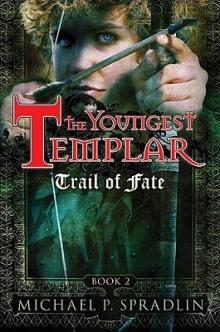 Trail of Fate
Trail of Fate Alcatraz
Alcatraz Every Zombie Eats Somebody Sometime
Every Zombie Eats Somebody Sometime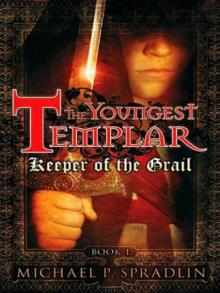 Keeper of the Grail tyt-1
Keeper of the Grail tyt-1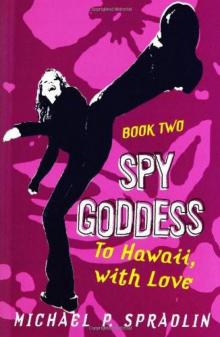 To Hawaii, with Love
To Hawaii, with Love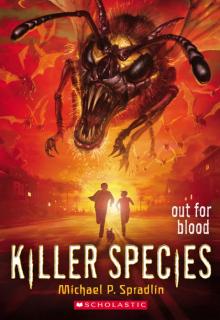 Out for Blood
Out for Blood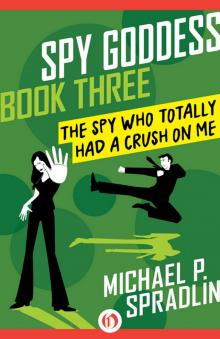 The Spy Who Totally Had a Crush on Me
The Spy Who Totally Had a Crush on Me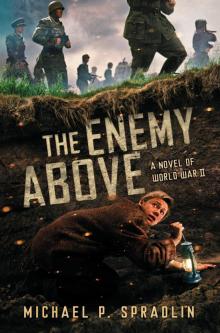 The Enemy Above
The Enemy Above Menace From the Deep
Menace From the Deep It's Beginning to Look a Lot Like Zombies
It's Beginning to Look a Lot Like Zombies Feeding Frenzy
Feeding Frenzy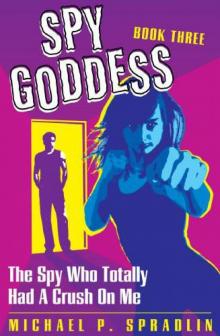 3 The Spy Who Totally Had a Crush on Me
3 The Spy Who Totally Had a Crush on Me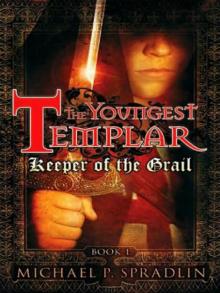 Keeper of the Grail
Keeper of the Grail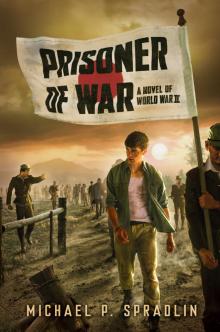 Prisoner of War
Prisoner of War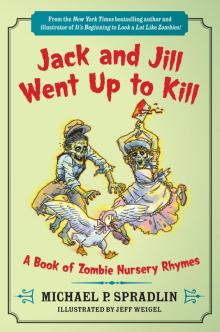 Jack and Jill Went Up to Kill
Jack and Jill Went Up to Kill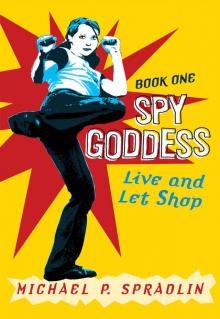 Live and Let Shop
Live and Let Shop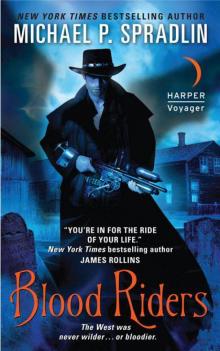 Blood Riders
Blood Riders Ultimate Attack
Ultimate Attack